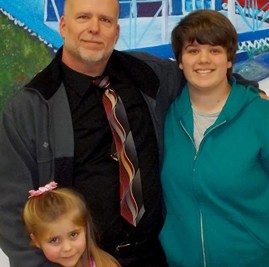Mike Johnson* was born in Fayetteville, NC and spent a lot of time with his dad in a family business installing floors and carpeting. Mike’s dad was a Navy man and served eight years at the end of the Korean War. Mike enlisted in the Navy himself so he “could see the world.” What he actually saw was so horrific; it would haunt him for years to come.
As a Navy medic, hospital corpsman and trained EMT, Mike was often among the first responders. During his first deployment, six of his fellow military brothers committed suicide. When the USS Bonefish submarine blew up, Mike and his team had to exhume and identify the bodies. It was no surprise that Mike returned home to a diagnosis of Post-Traumatic Stress Disorder (PTSD).
After the military, Mike returned to the family business and married a woman who was deaf and mute. He taught himself sign language and the marriage lasted for 17 years and produced a daughter who is now 16 years old. Despite the blessings in his life, Mike continued to be tormented by nightmares of his military experience. He turned to alcohol for relief and as a result, “every family member was going through their own hell.” What started as one or two drinks on a Friday or Saturday night led to all weekend drinking sprees to all week to finally needing a drink just to get out of bed in the morning. When his marriage ended and his daughter was placed in foster care, and colleagues he trusted with the family business stole it from him, Mike was “left with nothing.”
With his dad now in a rest home, his mother passed away, no siblings and no friends, Mike was truly alone. He admits to wanting to commit suicide but chose to return to the VA Hospital instead. A social worker at the hospital suggested Mike go to a shelter upon his release. She arranged for him to go to Good Shepherd. Hopeless, he agreed. He had gone a month at the hospital without drinking and was ready to being a journey toward sobriety.
While at Good Shepherd, Mike learned about the Ashley Center – a transitional housing program that provides a highly structured, 18-month program that combines affordable housing with on-site supportive services such as case management, substance abuse counseling and relapse prevention. According to Mike, “it was like going back to Boot Camp. It was regimented, organized, with a definite chain of command. I was held accountable and was responsible for certain duties. I had to be nice. It didn’t feel right at first but then it becomes a way of life. I now have an entire vocabulary without any bad words!”
While at Ashley, Mike met friends – men who understood his pain and demons. He admits that “three souls at Ashley lifted me up and hard schooled me. I came to realize I wasn’t lost at all.”
After graduating from the Ashley program on March 5, 2014, Mike moved into Permanent Supportive Housing at Ashley and now occupies his own apartment there. Permanent Supportive Housing is nationally considered a best practice strategy for ending homelessness. It combines an affordable rental unit with on-site supportive services but removes the time limit for participating residents. Mike is proud to be a part of this program.
Mike can now often be seen volunteering at Good Shepherd, either in the kitchen or at the front desk. He has put together his first resume and hopes to become a peer support specialist to help others who suffer with addiction, depression, anxiety or PTSD. Mike knows what it is to be homeless and penniless, to have no clothes or family and stands ready to help others on their journey back to housing, stability and independence.
“What I have learned,” Mike says “is the simple thing in life is just being. Living.” It doesn’t get much better than that.
*name changed for privacy

